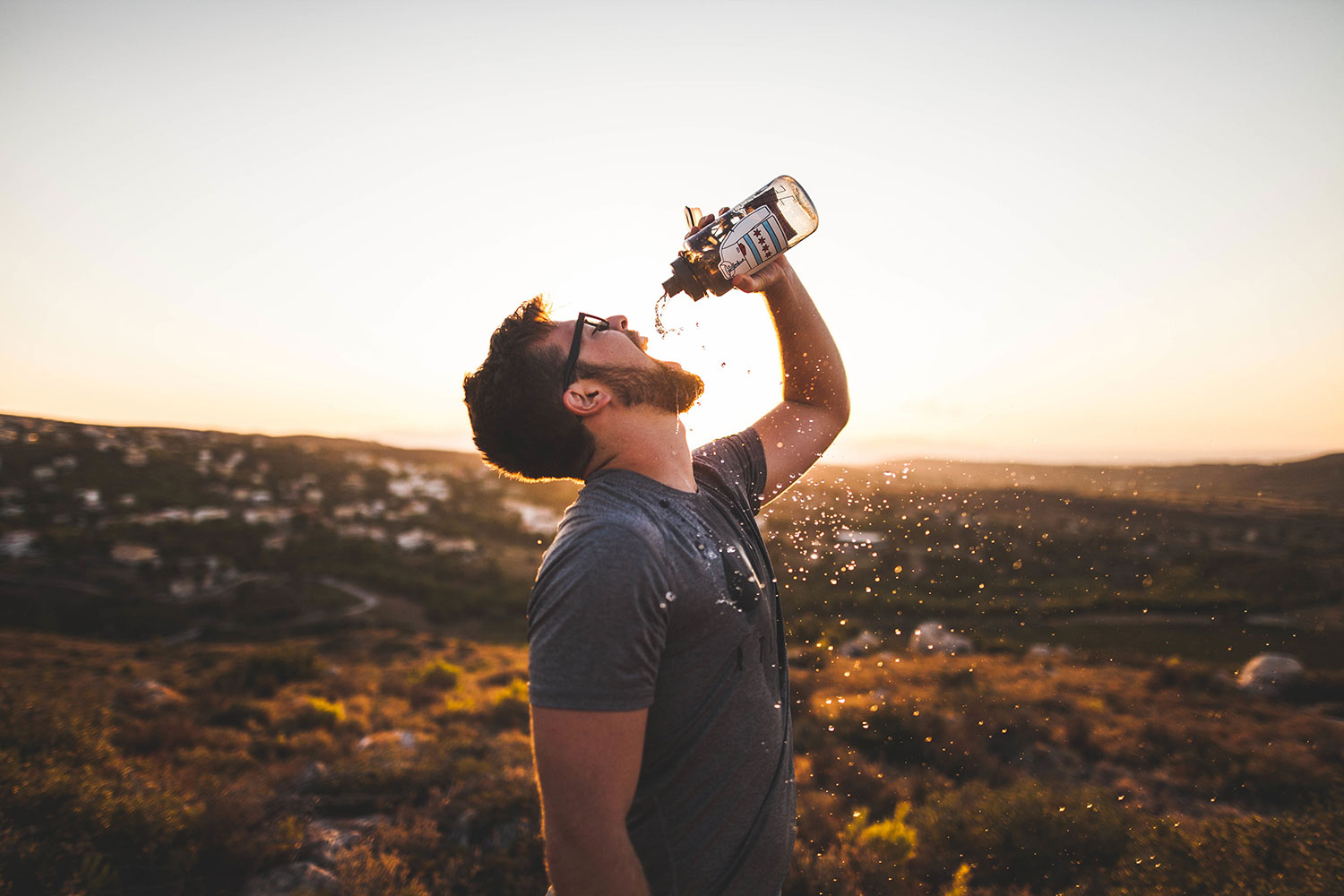Why You Should Raise Your Glass To Water

How much water does a healthy adult NEED to drink for maximal neuro-benefit?
Two litres a day? Enough so you’re not thirsty?
What about when we sweat or pee more than usual? What other symptoms are due to thirst?
What if the water contains caffeine? What about watery foods?
Let’s dive into the science of hydration, for both your body and your brain.
WHY IS HYDRATION SO CRITICAL TO YOUR BRAIN, OVERALL HEALTH...AND LIFE, IN GENERAL?
We’ve all heard the fact that our bodies are made of mostly water, and that humans can’t live for more than a few days without water. Water is, essentially, the most important nutrient of all.
That’s because water is critical for just about every function at the body system (eg. cardiovascular system), organ, cellular, and molecular levels. And, of course, this also goes for your nervous system, including your brain, spinal cord, and nerves, too.
I mean, we don’t want shriveled, pruney, dehydrated brains now, do we?
These are a few examples of how your body uses, needs, can’t live without water:
- Water acts as a shock absorber surrounding the brain and spinal cord (as “cerebrospinal fluid”), as well as to cushion joints.
- Water is a huge part of blood and lymph (the fluid of the lymphatic system), allowing the flow of nutrients, hormones, and other critical components throughout your body. How do you think your brain’s hormones control so many functions of the body?... They need to go with the flow (blood + lymph) to reach the target cells.
- The release of water is crucial to regulate temperature (sweating) and remove waste products in the urine. Random cool factoid: Your brain also has a “glymphatic” system that helps its waste products flow away from your brain, via the bloodstream to be filtered out by the kidneys.
PLUS, you need nicely flowing, hydrated blood, so the nutrients you take in from food and supplements can go where they need to go. You want the biggest bang for your buck, especially for those (sometimes expensive) supplements, right?
Would you believe that many of your cells give up some of their water when your blood gets too concentrated? Including brain cells, aren't they nice?!
We have water requirements at the cellular and molecular levels too. Would you believe that many of your cells give up some of their water when your blood gets too concentrated? Including brain cells, aren't they nice?! It makes sense, then, that when your cells give up the water they need to compensate for your dehydration, they don’t work as well. Water is also necessary for most of your critical biochemical reactions (a.k.a. “metabolism”) to take place.
BODY AND MIND SYMPTOMS OF “NON-IDEAL” LEVELS OF HYDRATION
Too much water (“hyperhydration”) can lead to kidney and bladder issues, and in extreme cases can lead to hyponatremia (low blood sodium) and encephalopathy (brain swelling).
On the other hand, extreme dehydration is a factor in both heat stroke and kidney stones.
Brain and mental health symptoms like alertness, headache, mood, short-term memory, and attention are often the first signs of dehydration.
Mild dehydration (4% or even 2% loss of body mass, due to water loss) can reduce your physical performance, as well as your ability to make essential proteins and carbohydrates. Not to mention that it can affect important neuro-functions too. In fact, brain and mental health symptoms like alertness, headache, mood, short-term memory, and attention are often the first signs of dehydration. Even levels of certain neurotransmitters have been shown to change during dehydration.
Several studies have shown that children had improved cognition (ability to think) in response to water consumption. Another study showed that university students who took sips of water during their exam tended to get better grades.
One hypothesis as to why dehydration can reduce the ability to respond and react quickly is that when the brain is distracted with the feeling of thirst, it directs attention away from cognitive performance (what we like to call “brainy functions”).
SO, HOW MUCH FLUID DO WE ACTUALLY NEED TO DRINK?
Scientifically speaking, the amount of water a healthy person needs every day is the amount necessary to maintain our “fluid balance” by:
- Replacing the fluid that’s lost (i.e. in sweat, urine, etc.), and
- Ensuring that there is enough to adequately dissolve certain “solutes” (i.e. minerals and electrolytes in the blood and other fluids – to do things like prevent kidney stones, for example).
In other words, we need to drink “enough for adequate hydration”.
There really isn’t a clear consensus, as THIS amount varies from person-to-person and day-to-day. For example, healthy adults can lose up to 3 litres of water per day, and that number increases with physical activity and heat exposure.
Your body regulates your hydration status when it senses that your blood is too concentrated.
Your body regulates your hydration status when it senses that your blood is too concentrated. When you need more fluid two things happen:
- You get thirsty, and
- Your hypothalamus (in your brain) and your pituitary gland release an “anti-diuretic hormone” that tells your kidney to reduce the water output in your urine.
For the most part, the body seems to “self-regulate” hydration; so when it starts getting slightly dehydrated, we get thirsty and make less urine...which is actually pretty “brainy”.
Some recommend for healthy adults to drink according to thirst and monitor urine colour (too dark means more fluids are needed). Although, this strategy is not considered sufficient for certain people such as children, older adults, athletes who train in hot weather, and people prone to certain medical conditions such as kidney stones and urinary tract infections.
Some health authorities recommend 2-2.3 litres/day for healthy women, and 2.5-3.3 litres/day for healthy men.
As you can see, there isn’t a “one size fits all” approach!
WHICH FOODS & FLUIDS COUNT TOWARD OUR “HYDRATION”?
Most of the fluid we replenish is through drinking, namely water, but other fluids also count.
What about caffeinated drinks? Studies using caffeine pills show that they’re dehydrating at high doses, but does this also apply to coffee and black tea?
You may be surprised to know that coffee CAN count toward your fluid intake...as long as the amount isn’t too high, and your body is already used to it.
You may be surprised to know that coffee CAN count toward your fluid intake...as long as the amount isn’t too high, and your body is already used to it. In other words, if you drink way more coffee than you’re used to, it will be a diuretic, meaning it will increase urine excretion. But if you are used to a daily “low to moderate” amount of coffee, up to about four 200 mL cups per day, it does not seem to be dehydrating.
And the same goes for black tea. Up to about six 240 mL cups of black tea seem to be as hydrating as similar amounts of water.
Typically, in holistic nutrition, we advise offsetting every cup of caffeinated beverage with a cup of water. So you can see, there are many schools of thought on how much water you actually need.
If you are going to have coffee and/or black tea, we suggest doing it in the most brainy way possible. So we’ve created a brain-boosting coffee creamer, here, as well as incredible peppermint tea latte and peppermint mocha recipes, here. Now, you can make your coffee and tea work better for you!
Also, some of our water can be ingested from “watery” foods. Many fruits and vegetables contain 70-90% water. We’ve listed a few top watery food below.
Foods over 90% water:
Cabbage, cantaloupe, watermelon, strawberries, celery, spinach, lettuce
Foods over 80% water:
Apples, pears, oranges, grapes, carrots, pineapple
Foods over 70% water:
Bananas, avocados, baked potatoes
So try increasing your water levels with some delicious foods. Our better slaw recipe is jam packed with high-water ingredients. Or, there is also soup, of course, to help increase your fluid status. Try our garlic turmeric bone broth recipe, here, for a yummy hydration hit.
So, let’s all raise a glass (er, a water glass, that is) to our “brainy” hydration!
- References
-
- Baron, S., Courbebaisse, M., Lepicard, E.M. & Friedlander, G. (2015). Assessment of hydration status in a large population. Br J Nutr. 113(1):147-58.
- Benton, D. & Young, H.A. (2015). Do small differences in hydration status affect mood and mental performance? Nutr Rev. 73 Suppl 2:83-96.
- Cheuvront, S.N. & Kenefick, R.W. (2016). Am I Drinking Enough? Yes, No, and Maybe. J Am Coll Nutr. 35(2):185-92.
- Cotter, J.D., Thornton, S.N., Lee, J.K. & Laursen, P.B. (2014). Are we being drowned in hydration advice? Thirsty for more? Extrem Physiol Med. 3:18.
- Killer, S.C., Blannin, A.K. & Jeukendrup, A.E. (2014). No evidence of dehydration with moderate daily coffee intake: a counterbalanced cross-over study in a free-living population. PLoS One. 9(1):e84154.
- Masento, N.A., Golightly, M., Field, D.T., Butler, L.T. & van Reekum, C.M. (2014). Effects of hydration status on cognitive performance and mood. Br J Nutr. 111(10):1841-52.
- Maughan, R.J. (2012). Hydration, morbidity, and mortality in vulnerable populations. Nutr Rev. 70 Suppl 2:S152-5.
- McCotter, L., Douglas,P., Laur, C., Gandy, J., Fitzpatrick, L., Rajput-Ray, M. & Ray, S. (2016). Hydration education: developing, piloting and evaluating a hydration education package for general practitioners. BMJ Open. 6(12): e012004
- Mendelsohn, A.R. & Larrick, J.W. (2013). Sleep facilitates clearance of metabolites from the brain: glymphatic function in aging and neurodegenerative diseases. Rejuvenation Res, 16(6):518-23.
- Nacamulli, M. What would happen if you didn’t drink water? TED-Ed Original video.
- Nissensohn, M., López-Ufano, M., Castro-Quezada, I. & Serra-Majem, L. (2015). Assessment of beverage intake and hydration status. Nutr Hosp. 31 Suppl 3:62-9.
- Popkin, B.M., D'Anci, K.E. & Rosenberg, I,H. (2010). Water, hydration, and health. Nutr Rev. 68(8):439-58.
- Ruxton, C.H. & Hart, V.A. (2011). Black tea is not significantly different from water in the maintenance of normal hydration in human subjects: results from a randomised controlled trial. Br J Nutr. 2011 Aug;106(4):588-95.
- Spector, R., Snodgrass S.R. & Johanson, C.E. (2015). A balanced view of the cerebrospinal fluid composition and functions: Focus on adult humans. Exp Neurol. 273:57-68.








